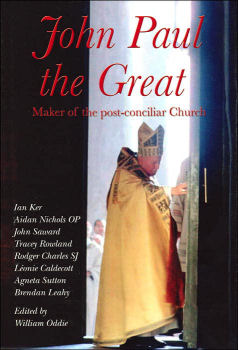
|
Posted October 18, 2005
Book: John Paul the Great: Maker of the Post-Conciliar Church Editor: Wiliam Oddie Ignatius Press, San Francisco, CA, pp. 186 An Excerpt from the Jacket:
Far from being a reactionary, this has been a pope of startling originality and intellectual range, who has led and inaugurated change as well as defending the tradition of the Church. Newman wrote of Gregory the Great that he was one of those popes who have never been slow to venture out upon a new line, when it was necessary, and who, independent of times and places, have never found any difficulty, when the proper moment came, of following out a new and daring policy. This could have been written by John Paul II. An Excerpt from the Book: Thus from Gregory the Great to Gregory III, the papacy encouraged and supported monasticism, the first great movement that begins in the third century. Just as these popes saw the missionary potential of monasticism, so too the mendicant movements of Francis of Assisi and Dominic in the thirteenth century ‘found their support in the holder of an universal ecclesial ministry, in the Pope as guarantee of the mission and the upbuilding of the one Church.’ And this had the important ecclesiological effect of developing the doctrine of papal primacy, which ‘was understood anew in the light of its apostolic roots’. After touching on the apostolic movements of evangelization that began in the sixteenth century, particularly that of the Society of Jesus, and the missionary congregations of the nineteenth century, Ratzinger again stressed that these movements which serve the universal mission of the Church and not merely the local Church are essential to the Church and the pope has ‘to relay on them’ and ‘they on him’. These apostolic movements differ from each other ‘because they are the Holy Spirit’s answer to the ever changing situations in which the Church lives’. The ‘generally derive their origin from a charismatic leader and take shape in concrete communities, inspired by the life of their founder; they attempt to live the Gospel anew, in its totality.’ Ratzinger is in no doubt that in our own times the Church is again enjoying another great charismatic experience in the form of the new so-called ‘ecclesial movements’. At the beginning of his address he quoted the reference in Pope John II’s encyclical Redemptoris missio (1990) to ‘a new development . . .the rapid growth of “ecclesial movements” filled with missionary dynamism’, which; represent a true gift from God both for new evangelization and for missionary activity . . .I therefore recommend that they spread, and that they be used to give fresh energy, especially among young people, to the Christian life and to evangelization. . .’ And Ratzinger enthusiastically echoed the Pope’s words: ‘For me personally it was a wonderful experience when, in the early 1980s, I first came into close contact with movements such as the Neocatechumenal Way, Communion and Liberation and the Focolare Movement, and so experienced the energy and enthusiasm with which they lived their faith and the joy of their faith . . .That was the period in which Karl Rahner and others were speaking of a winter in the Church; and indeed, it did seem that, after the great flowering of the Council, spring had been reclaimed by frost, and that the new dynamism had succumbed to exhaustion.’ But Ratzinger concluded his address by recognizing that yet again it was the papacy above all which deserved credit for the ‘discernment of spirits’ in the matter of the new movements: ‘Above all. . .let us thank Pope John Paul II. He surpasses us all in his capacity for enthusiasm . . .’ Nor does it require much reading between the lines to sense the contrast Ratzinger makes between this papal encouragement and support an the suspicion or even hostility of many local bishops. While warning the movements against any kind of elitism or exclusivism, the Cardinal’s warning to local churches and bishops is noticeably more lengthy and pointed, for he sees history repeating itself: . . . the local Churches . . .even the bishops, must be reminded that they must avoid any uniformity of pastoral organization and programmes. They must not turn their own pastoral plans into the criterion of what the Holy Spirit allowed to do: an obsession with planning could render the Churches impervious to the action of the Holy Spirit . . .Not everything should be fitted into the straight jacket of a single uniform organisation; what is needed is less organization and more Spirit! Above all, a concept of communio, in which the highest pastoral value is attached to the avoidance of conflict, should be rejected. Faith remains a sword and may demand conflict for the sake of truth and love. Table of Contents: 1. John Paul the Great William Oddie 2. Reclaiming the tradition: John Paul II as the authentic interpreter of Vatican II Tracey Rowland 3. The radicalism of the papacy: John Paul II and the new ecclesial movements Ian Ker 4. Totus Tuus: The Mariology of John Paul II Brendan Leahy 5. Recognizing the Rose: John Paul II and the causes of the saints John Saward 6. Sincere Gift: the new feminism of John Paul II Leonie Caldecott 7. Facing the sexual revolution: John Paul II’s language of the body Agneta Sutton 8. The social teaching of John Paul II and its implications for Catholic education for life Rodger Charles, S.J. 9. Pastor and doctor: the encyclicals of John Paul II Aidan Nichols, OP |
|
